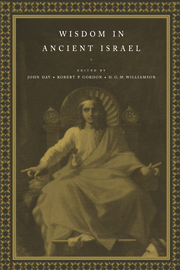Book contents
- Frontmatter
- Contents
- List of abbreviations
- Introduction
- Part 1 The ancient near eastern setting
- 1 Egyptian wisdom literature
- 2 Some new Babylonian wisdom literature
- 3 The Wisdom of Ahiqar
- Part 2 Old Testament and Apocryphal texts
- Part 3 Themes
- Biographical note: John Adney Emerton
- Bibliography of the works of John Adney Emerton
- Indexes
- Principal biblical and apocryphal references
2 - Some new Babylonian wisdom literature
Published online by Cambridge University Press: 16 October 2009
- Frontmatter
- Contents
- List of abbreviations
- Introduction
- Part 1 The ancient near eastern setting
- 1 Egyptian wisdom literature
- 2 Some new Babylonian wisdom literature
- 3 The Wisdom of Ahiqar
- Part 2 Old Testament and Apocryphal texts
- Part 3 Themes
- Biographical note: John Adney Emerton
- Bibliography of the works of John Adney Emerton
- Indexes
- Principal biblical and apocryphal references
Summary
It is now over thirty years since the present writer, following a suggestion of the late Sidney Smith, produced a corpus of Babylonian Wisdom Literature (Oxford, 1960). The time is now ripe to survey some additions that have since come to light, both published and unpublished, and to consider some of the ideological issues which have been debated since. The corpus was basically a text edition, and touched only very lightly on the thought-content and on comparisons with other literatures, such as biblical Hebrew texts. The demarcation from Sumerian was mainly practical. Such texts in that language which might be called ‘wisdom’ were often of uncertain meaning in key parts, and the writer had no access to the large amount of unpublished material from Nippur. Also, not all texts compared with Hebrew wisdom literature are really of the same category. Thus what the late S.N. Kramer called ‘Man and his God’ and compared with Job should not, in the present writer's opinion, be considered wisdom because this Sumerian sufferer confesses his sins while asking for release from his sufferings.
The Hebrew term ‘wisdom’ and other derivatives of the root can refer to skill of any kind (note the case of Bezalel), but there also existed a specialized use of the term, for ‘piety’ in effect, so that in this sense hokmâ embraces the whole conduct of life in service to God. In the modern world the term has often been used to refer to the Hebrew books which are especially devoted to inculcating right living and to reflecting on its implications. The various Babylonian terms for ‘wise’ and ‘wisdom’ can likewise be used for any kind of skill.
- Type
- Chapter
- Information
- Wisdom in Ancient Israel , pp. 30 - 42Publisher: Cambridge University PressPrint publication year: 1995
- 17
- Cited by



